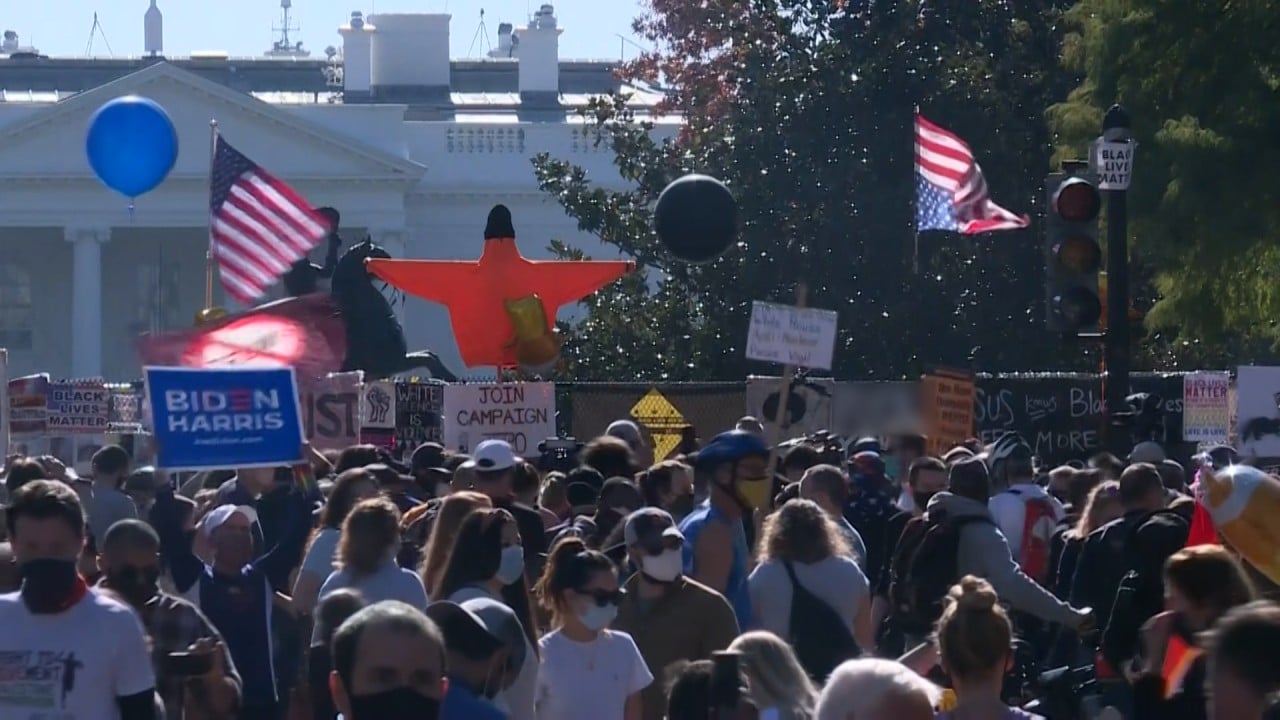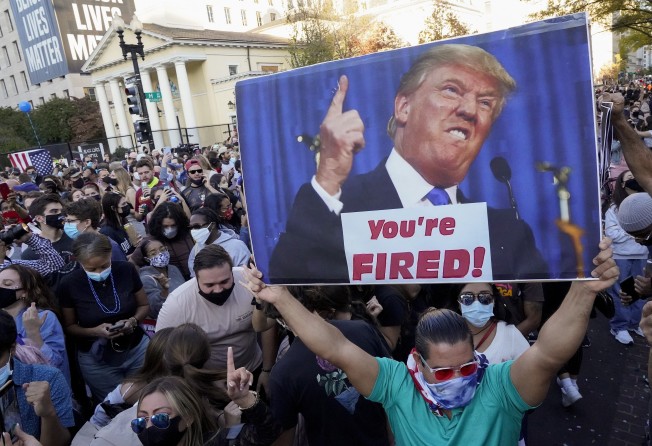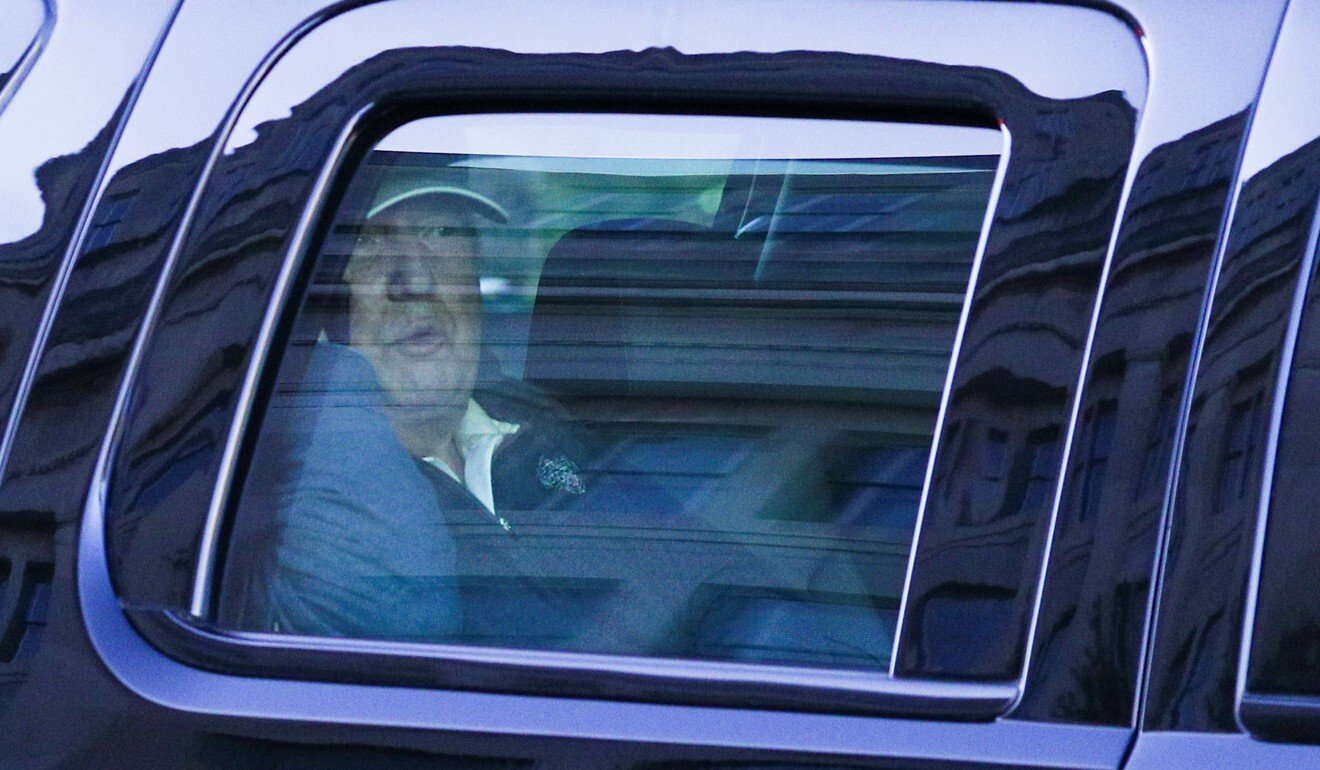
01:15
People celebrate as Joe Biden win US presidential election, according to the Associated Press

With few signs that US President Donald Trump will leave office gracefully after his defeat, experts and former officials see a growing risk that he could make disruptive moves to double down on priorities and tie his successor’s hands in his final months in the White House.
The victory of former vice-president Joe Biden on Saturday came as Trump has refused to accept the vote counts that had been coming in since Tuesday night. Without evidence, Trump has accused Democrats of widespread electoral fraud, filed a slew of poll-related lawsuits and cast doubt on his commitment to a peaceful transfer of power.
“I think there is a good chance for mischief across a range of US polices leading up to the inauguration” on January 20, said James Green, a Georgetown University senior fellow and former trade negotiator based in the US embassy in Beijing. “In terms of cooperative handover procedures, I worry about that. It seems to me one of those norms that the Trump administration has no interest in upholding.”
If Trump decides to go out with a bang, a likely focus would be foreign policy, using tools he can wield quickly and relatively unencumbered. These include executive orders, agency rule making, appointments that don’t require Senate confirmation and moving political appointees to civil servant jobs that are difficult to upend, a practice known as “burrowing in”.

01:15
People celebrate as Joe Biden win US presidential election, according to the Associated Press
And China could be a particular target, experts add, given Trump’s repeated efforts to deflect responsibility and blame Beijing for the pandemic and sagging economy that undercut his re-election prospects.
“Trump has promised to punish China for Covid-19, so the question is, what does that mean,” said Jeff Moon, principal at China Moon Strategies and former National Security Council official, who sees a high probability of last-minute punitive moves against Beijing.
With administration energy still focused on electoral court challenges, there is no evidence yet of plans to undercut Biden. And Trump, despite his history of narrow partisanship and norm breaking, would not be the first president to try to cement his administration’s legacy or frustrate future policy shifts.
But one way to quickly worsen already dismal US-China relations – and undermine any Biden administration bid to improve bilateral cooperation on global environmental and health issues – could involve Taiwan. Options might include sending another cabinet member to Taipei, further strengthening US-Taiwan military ties and announcing negotiations toward a free trade agreement.
“That’s generally true overall,” said Bonnie Glaser, director of Center for Strategic and International Studies’ China Power Project. “They’re trying to nail down as many policies as they can that will be hard to reverse, whether it’s on China or Iran or elsewhere.”
Human rights would offer another easy target. Beyond taking the potentially explosive step of labelling China guilty of “genocide” for the mass detention of Uygurs in Xinjiang, Trump could block visas for more Communist Party officials, or make trouble by trying to order US athletes to skip the Beijing 2022 Winter Olympics.
Although executive orders don’t carry the weight of law, making them therefore easier to reverse, they could hobble an incoming Biden administration amid concern that unwinding them would make it look soft. Quick reversals also would undercut America’s already damaged credibility as an ally and adversary.
Fuelling the optics is growing policy concern and wariness among Americans as Beijing expands in the South China Sea, flexes its muscles with India, Japan and Southeast Asia and tightens its grip on Xinjiang, Hong Kong and Taiwan. According to the Pew Research Centre, 73 per cent of Americans hold a negative view of China, up 13 percentage points from last year and 20 points from 2017 when Trump took office.
“All of that makes the case for working with China harder to argue,” said Thomas Duesterberg, a Hudson Institute fellow and former Commerce Department official.
Biden is also juggling his party’s left wing and faces almost certain, blistering criticism from hardline Republicans, Fox News anchors and partisan voters, not to mention a sidelined but rarely silent Trump.
A 130-page China Task Force report released in late September with its 82 key findings and 400 “forward leaning” recommendations” amounts to a Republican playbook, with calls to investigate genocide claims, coordinate an “all of government” response to Communist Party propaganda, check Beijing’s role in the UN and fund technologies to circumvent Chinese censorship.
“It’s obvious that the Republican critique is going to be that Biden is soft on China and communists,” said Christopher Miller, assistant professor of international history at Tufts University’s Fletcher School of Law and Diplomacy. “You can already write those speeches.”

06:04
US-China relations: Joe Biden would approach China with more ‘regularity and normality’
Other Trump options include: subjecting more Chinese state-owned companies to sanctions, expanding restrictions on “dual-use” civilian-military exports, banning more Chinese apps after its TikTok and WeChat campaigns and blocking all semiconductor sales to Huawei Technologies beyond those for 5G networks. And Washington could declare Beijing a currency manipulator exposing it to punitive duties, said Duesterberg.
If an outgoing Trump administration were really keen to leave behind a mess, experts said, it could even announce a Nato withdrawal or complete troop pull-out from Afghanistan, creating a regional vacuum and fuelling Pentagon disquiet. According to the Congressional Research Service (CRS), a poorly handled presidential transition creates potential national security vulnerabilities that US adversaries can exploit.
“The military would go nuts,” said a former US official who asked not to be identified. “He could also make some major concessions to Russia.”
Even without unsettling eleventh-hour moves, an incoming Biden administration will be confronting a more emboldened Beijing. “China’s power has increased considerably in the last four years,” said Sarah Kreps, a Cornell University law and government professor. “I would therefore expect many of the Biden policies to bear some resemblance to the Trump administration.”
Also problematic would be unwinding hundreds of millions of dollars in import taxes imposed during the trade war, possibly a prerequisite for resetting the relationship with Beijing.
“It will be politically difficult to simply take the tariffs off without getting something in return,” said Zack Cooper, a research fellow at the conservative American Enterprise Institute and former official in the George W Bush administration. “The question is what to push for that Beijing can do quickly and show real results.”
All of which would likely take time given the immediate health, economic and race relations crises at home as well as the depth of US-China distrust. “Repairing the relationship to make it less adversarial will require an accumulation of small steps rather than one dramatic breakthrough,” said Frank Jannuzi, president of the Mansfield Foundation and formerly a long-time Senate adviser to Biden.
One approach, analysts said, could be to repeal Section 232 steel and aluminium tariffs that were imposed on national security grounds, justifying the move as needed to repair ties with long-standing European and Asian allies needed to counter Beijing chest-thumping.
More problematic are Section 301 tariffs over forced Chinese technology transfers, analysts said. But these could be whittled down in return for Chinese human rights and intellectual property concessions, a shift sold to Americans on the grounds they gum up the economy, hurt farmers and cost American manufacturing jobs.
“It’s a challenge, but it’s doable,” said Moon. “Everyone knows that China is not paying these tariffs, it’s the American consumer.”
While experts fear that anger, revenge or concern over cheating could fuel any precipitous Trump moves, historians say he is in good company among presidents rushing through changes before leaving the job – although most conceded the election, committed to an orderly handover and stopped short of fanning conspiracy theories.
The biggest rush of last-minute changes tended to occur when presidents are succeeded by a rival political party, said University of Chicago professor William Howell and University of Wisconsin at Madison professor Kenneth Mayer; Trump is the 12th such president since 1900.
“If the sitting president (or his party) lost the election, he has every reason to hurry through last-minute public policies, doing whatever possible to tie his successor’s hands,” they wrote in Presidential Studies Quarterly.
Trump gravitated early to executive orders, issuing 33 in his first four months, nearly double Ronald Reagan’s prolific 18 and fuelling speculation that he could surpass in number and scope their use among his predecessors in their final two months. These include Barack Obama with 17, Bill Clinton with 22 and Jimmy Carter’s 36, including orders tied to the release of American hostages held in Iran, according to the US National Archives and Records Administration.
Trump also has company should he opt to rush through pardons for his associates, a number of whom have been arrested, charged or convicted of charges spanning tax and bank fraud, orchestrating hush money, lying to Congress and the FBI, conspiracy and possession of child pornography.
Since 1945, every president but Lyndon Johnson has gone on a final pardon spree, led by Obama’s 300 a month and Clinton’s 65. Some of them touched on sensitive foreign policy issues, including President George HW Bush, who issued pardons tied to the Iran-Contra affair, and President George W Bush, who commuted the sentences of border guards convicted of shooting a Mexican citizen, angering Mexico City.

Legal experts debate whether Trump could pardon himself given that, once out of office, he and his companies could face a slew of federal and state investigations and personal lawsuits for alleged defamation, tax avoidance, using non-profit funds improperly and failing to pay US$2 million in legal fees. Trump has denied breaking any laws.
“A huge number of pardons are a given,” said the former official. “I wouldn’t be surprised if, within a week of his leaving office, the US attorney for the Southern District of New York comes out with cases.”
And outgoing administrations have a history of last-minute administrative changes, according to CRS, a practice known as “midnight rule making”. Trump has repeatedly attacked the “deep state”, sparking concern he could redouble efforts to undermine government departments.
“I worry about massive document destruction at the National Security Council and State Department, which would hobble an incoming administration trying to understand what past agreements were and what was said to whom,” said Green.
One caveat, however, Washington veterans say, is the possibility that infighting could frustrate any efforts to punish China and Biden. Some cabinet secretaries will likely be in favour of a continued tough line against Beijing. The State Department might seek to deny visas for top Chinese officials; the Defence and Commerce departments could support more export restrictions; and the Justice Department might step up indictments of Chinese students and scientists, for instance. But those actions could face resistance from the Treasury Department and US Trade Representative’s Office wanting to protect what they consider a signature achievement: the US-China phase one trade agreement.
Even Trump may have conflicting agendas.
Said Green: “There will be tension inside the administration between the China hawks that want to tie the hands of the incoming Biden team and the personal wishes of the first family looking to maintain good relations with Beijing to ensure future Chinese investment or smooth over business opportunities there.”
Additional reporting by Robert Delaney